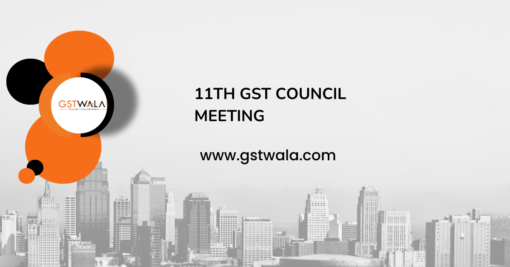This document appears to be the minutes of the eleventh meeting of the GST Council, held on 4 March 2017 in New Delhi. The meeting was chaired by the Hon’ble Union Finance Minister, Shri Arun Jaitley.
Agenda Items For Discussion in the 11th Meeting
The agenda items included confirmation of the minutes of the 10th GST Council meeting, held on 18th February 2017.
Approval of the Draft Central Goods and Services Tax (CGST) Law as modified s accordance with the GST Council and as vetted by the Ministry of Law & Justice.
The Draft Integrated Goods and Services Tax (IGST) Law, development of an e-Waybill System by Goods and Services Tax Network (GSTN), and the date of the next meeting of the GST Council.
The members discussed the amendments to the draft minutes of the 10th meeting and highlighted some issues that had to be brought back to the Council for decision. They also discussed the proposed tax rates for restaurants, the Composition scheme, and the legal provision for matching the annual GST return of a taxpayer with his annual financial statement. The Secretary informed the members that ten more amendments were incorporated into the draft CGST Law based on the inputs received in a meeting with officers from the Centre and the State convened by him on 3 March 2017. The ten amendments were circulated to the members before the meeting, and the Secretary requested that the members offer comments on these suggested amendments while discussing the draft CGST Law circulated as an agenda note for this meeting. The ten amendments include changes to various sections, including Section 2, Section 109, Section 110, Section 118, Section 129, Section 67, Section 168, Schedule I, Schedule III, and Section 19. The amendments are related to issues such as the definition of “other territory,” the hearing of appeals, the term of office of Technical Members of the Appellate Tribunal, appeals to the Supreme Court, the furnishing of security, seizure of goods, inventory of goods, the Commissioner, and supply of goods or services between related or distinct persons. The discussion was about the interest rate for delayed refunds in the GST regime in India. The Hon’ble Minister from West Bengal stated that in his State, 90% of the self-declared refund claim was given automatically, and only 10% was held back for checking for any violation. The Hon’ble Minister from Uttar Pradesh suggested that if the refund was not paid within 3 to 4 months of filing the claim, a higher rate of interest should be paid by the Government. The Commissioner (GST Policy Wing), CBEC informed that the clause of interest payment for delayed refund applied when the refund was paid beyond a period of 60 days from the date of filling the application. The Hon’ble Chief Minister of Puducherry stated that the Government machinery should be given better leverage regarding the payment of interest, and the 6% rate of interest was reasonable. The discussion also touched upon the issue of the Government withholding the payment of refunds due to a stay order given by a court and the issue of parity in the rate of interest for the taxpayer and the Government. The Hon’ble Minister from West Bengal observed that the optimal level of interest rate should be 18%, and an interest rate of 24% was too high. Shri Arun Goyal, Additional Secretary, GST Council pointed out that the language used in Section 50 of the draft CGST Law was to ‘pay interest at such rate, not exceeding 18%, and that this gave some flexibility to the Government in fixing the actual rate of interest for delayed payment of tax. This is a report of the 14th meeting of the Goods and Services Tax (GST) Council held on May 18, 2017. The meeting was chaired by the Hon’ble Finance Minister, Shri Arun Jaitley. The report provides details of the discussions that took place during the meeting on various topics related to GST. The discussions covered issues related to the implementation of GST, the rates of GST on different goods and services, and the division of tax administration powers between the central and state governments. Several suggestions were made by the council members on these issues, and some decisions were taken based on these suggestions. These minutes relate to the meeting of the Goods and Services Tax (GST) Council held on 16th March 2017. The meeting was attended by various ministers and officers from the central and state governments. Several issues related to the draft GST laws were discussed during the meeting, including the scope of works contracts, the entitlement to input tax credit, and the need for filing a refund application. The Council also decided not to incorporate the definitions of ‘intra-State supply of goods’ and ‘intra-State supply of services’ in the CGST Act as it was already contained in the IGST Act. Additionally, the Council discussed the definition of ‘proper officer’ and how it related to officers of the rank of Commissioner. Finally, the Deputy Chief Minister of Delhi raised the issue of designating the sale of land and buildings neither as the supply of goods nor the supply of services, which would lead to a break in the input tax credit chain. The Goods and Services Tax (GST) Council met for its 16th meeting on 11th June 2017 to discuss and approve some changes to the GST laws. Some of the key points from the meeting include:
The GST Council approved the draft rules on e-way bills, which are required for the movement of goods worth over Rs. 50,000.
The GST Council agreed to modify its earlier decision on incorporating a provision similar to the Proviso to Section 108(2) for the State Bench, relating to the National Tribunal and agreed not to have a similar provision for the State Bench.
The provision contained in Section 7(1)(b), namely, ‘import of services for a consideration whether or not in course or furtherance of business,’ was decided to be kept as part of Section 7 of the CGST Law.
The rate of tax collection at source by electronic commerce operators shall be up to 1% and not frozen at 1% as currently drafted in Section 52(1) of the draft CGST Law.
A provision was suggested to be put in the CGST Law that any reference to any legislation in the CGST Law shall include the corresponding law of the State of Jammu & Kashmir if it applied there.
The Council agreed to re-examine Section 31(3)(b) and the Proviso to Section 31(3)(c) of the draft CGST Law, which provides that the registered person may not issue a bill of supply if the value of the goods or services or both supplied is less than two hundred rupees, except where the recipient requires such bill.
The Principal Secretary (Finance), Odisha suggested that there should be a provision in Section 117 of the draft CGST Law that an appellant should pay the full amount of tax in dispute before filing an appeal in High Court. The Council approved the draft CGST Law with changes recorded in the meeting and authorized the Law Committee of Officers to make minor corrections. The changes included renumbering sub-clause (a) after Section 2(80) of the draft CGST Law, redefining the term “proper officer” in the draft CGST Act, aligning the language of the expression ‘works contract’ in Clause 6 of Schedule II and Section 2(118) of the draft CGST Law, reformulating the existing text of Section 6 of the draft CGST Act, modifying the decision taken in the 10th Meeting of the Council, adding words to Section 19(1), re-examining Section 31(3)(b) and Proviso to Section 31 (3)(c), changing the wording in Section 52(1), replacing the reference to Section 50 with Section 56 in Section 54(12), modifying Section 56, adding words to the proviso to Section 67(2), adding words to Section 67(9), and adding a Proviso in Section 109(10). The Council instructed that all changes would be shown in the track change mode and shared with the States within three working days of the meeting.
This is a meeting minutes document from the 11th GST Council meeting held on March 4, 2017, in New Delhi, India. The document covers the discussions held during the meeting regarding the draft IGST (Integrated Goods and Services Tax) Law. The Secretary invited the Commissioner (GST Policy Wing), CBEC to brief the Council on the changes made in the draft IGST Law. Several ministers raised concerns and suggestions regarding the draft law. The issues discussed in the meeting include whether the IGST Law should extend to Union Territories without Legislature, the definition of the SGST Act, the export of services, and the collection of IGST inclusive of Customs duty.
Agenda Item 1: Approval of the Minutes of the 10th Meeting
The Council approved the minutes of the 10th Meeting held on February 18, 2017.
Agenda Item 2: Approval of the Draft Central Goods and Services Tax (CGST) Law and Integrated Goods and Services Tax (IGST) Law
The Council approved the CGST and IGST Laws, which were previously circulated to the States for comments and feedback.
Agenda Item 3: Approval of the Draft Union Territory Goods and Services Tax (UTGST) Law
The Council approved the UTGST Law, which was previously circulated to the Union Territories for comments and feedback.
Agenda Item 4: Development of an e-Waybill System by Goods and Services Tax Network (GSTN)
The Council approved the proposal to create an Electronic Waybills System Module as part of the GST System through GSTN. The cost of developing and operating the same would be borne by the Central and State Governments.
Agenda Item 5: Date of the Next Meeting of the GST Council
The Council agreed to hold its next meeting on March 16, 2017, in New Delhi, to approve the Model SGST Law and the UTGST Law.
Agenda Item 6: Any Other Agenda Item with the Permission of the Chairperson
The Hon’ble Minister from Uttar Pradesh raised the issue of the slow migration of existing taxpayers to GSTN. The Hon’ble Chairperson observed that the work of migration of existing taxpayers should be carried out efficiently. The Council also expressed appreciation for the hard work of the officers of the Law Committee and the Hon’ble Chairperson’s role in steering the successful completion of the discussion on the CGST and IGST Laws. The meeting ended with a vote of thanks to the chair.


